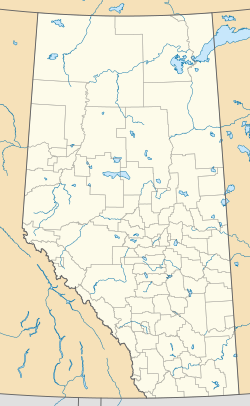Hughenden, Alberta
Hughenden | |
|---|---|
| Village of Hughenden | |
 Hughenden | |
| Coordinates: 52°30′39″N 110°58′11″W / 52.51083°N 110.96972°WCoordinates: 52°30′39″N 110°58′11″W / 52.51083°N 110.96972°W | |
| Country | Canada |
| Province | Alberta |
| Region | Central Alberta |
| Census Division | No. 7 |
| Municipal district | Municipal District of Provost No. 52 |
| Incorporated[1] | |
| • Village | December 27, 1917 |
| Government | |
| • Mayor | Jeanette Ruud |
| • Governing body | Hughenden Village Council |
| Area (2016)[3] | |
| • Land | 0.78 km2 (0.30 sq mi) |
| Elevation | 690 m (2,260 ft) |
| Population (2016)[3] | |
| • Total | 243 |
| • Density | 309.9/km2 (803/sq mi) |
| Time zone | UTC−7 (MST) |
| • Summer (DST) | UTC−6 (MDT) |
| Highways | 13 |
| Website | Official website |
Hughenden /hjuːˈɛndən/ is a village in central Alberta, Canada. It is located 49 km south of Wainwright, in the Municipal District of Provost No. 52, along Highway 13.
The community takes its name from the Hughenden Manor, home of Benjamin Disraeli.[4]
Demographics[]
In the 2016 Census of Population conducted by Statistics Canada, the Village of Hughenden recorded a population of 243 living in 101 of its 117 total private dwellings, a 5.7% change from its 2011 population of 230. With a land area of 0.78 km2 (0.30 sq mi), it had a population density of 311.5/km2 (806.9/sq mi) in 2016.[3]
The Village of Hughenden's 2012 municipal census counted a population of 258,[5] a 0.3% decrease over its 2008 municipal census population of 266.[6]
In the 2011 Census, the Village of Hughenden had a population of 230 living in 89 of its 106 total dwellings, a -0.4% change from its 2006 population of 231. With a land area of 0.78 km2 (0.30 sq mi), it had a population density of 294.9/km2 (763.7/sq mi) in 2011.[7]
See also[]
References[]
- ^ "Location and History Profile: Village of Hughenden" (PDF). Alberta Municipal Affairs. October 21, 2016. p. 379. Retrieved October 23, 2016.
- ^ "Municipal Officials Search". Alberta Municipal Affairs. May 9, 2019. Retrieved October 1, 2021.
- ^ a b c "Population and dwelling counts, for Canada, provinces and territories, and census subdivisions (municipalities), 2016 and 2011 censuses – 100% data (Alberta)". Statistics Canada. February 8, 2017. Retrieved February 8, 2017.
- ^ Place-names of Alberta. Ottawa: Geographic Board of Canada. 1928. p. 66.
- ^ "2012 Municipal Affairs Population List" (PDF). Alberta Municipal Affairs. 2012-11-22. Retrieved 2012-12-14.
- ^ "Alberta 2009 Official Population List" (PDF). Alberta Municipal Affairs. 2009-09-15. Retrieved 2010-09-14.
- ^ "Population and dwelling counts, for Canada, provinces and territories, and census subdivisions (municipalities), 2011 and 2006 censuses (Alberta)". Statistics Canada. February 8, 2012. Retrieved February 8, 2012.
External links[]
- 1917 establishments in Alberta
- Villages in Alberta
